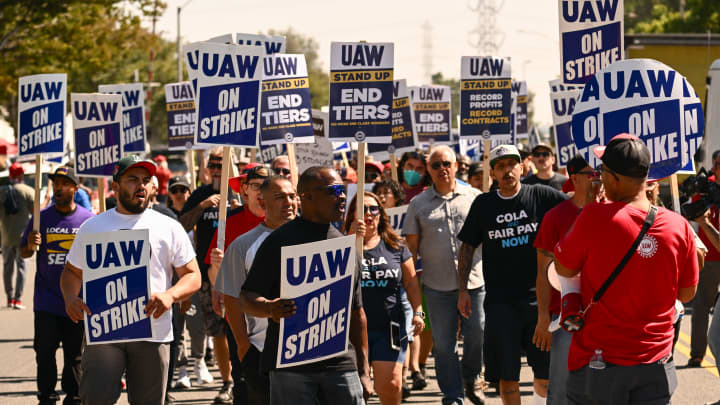
DETROIT — The United Auto Workers union will announce expanded strikes at , and plants if the sides don't make significant progress in negotiations by 10 a.m. ET Friday, according to a person familiar with the matter.
The new union-imposed deadline comes a week after the UAW announced it would expand its at assembly plants of each of the Detroit automakers to and distribution locations for GM and Stellantis. The UAW did not expand its strikes at , citing progress in those talks.
Like a week earlier, it's expected that UAW President Shawn Fain will host a Facebook Live event to announce which plants will walk out at noon Friday, barring progress in the talks.
The about 18,300 workers, or 12.5% of the UAW's 146,000 members whose labor contracts expired on Sept. 14.
Fain previously said the union planned to , based on how negotiations with the companies were going. The union is calling the work stoppages "stand-up strikes," a nod to historic "sit-down" strikes by the UAW in the 1930s.
Spokespeople for the Detroit automakers did not immediately respond for comment on Wednesday.
The additional strike plans come despite record contract offers from the automakers that include roughly 20% hourly wage increases, thousands of dollars in bonuses, retention of the union's platinum health care and other sweetened benefits.
The union's new deadline comes a day after President Joe Biden joined Fain and union members, becoming to walk a picket line with striking autoworkers. Biden also voiced support for the union and its demands, including a during the life of the contract.
The UAW has further demanded a shortened workweek, a shift back to traditional pensions, the elimination of compensation tiers and a restoration of cost-of-living adjustments, among other improvements.
Unlike past strikes, UAW leaders opted for targeted strikes at select plants instead of initiating national walkouts.
The strategy is in an effort to keep the automakers on edge in an effort to pit them against one another to achieve better contracts, according to private messages involving UAW communications director Jonah Furman.
The messages, which described a strategy to cause "recurring reputations damage and operational chaos" for the companies, were heavily criticized by the automakers.



